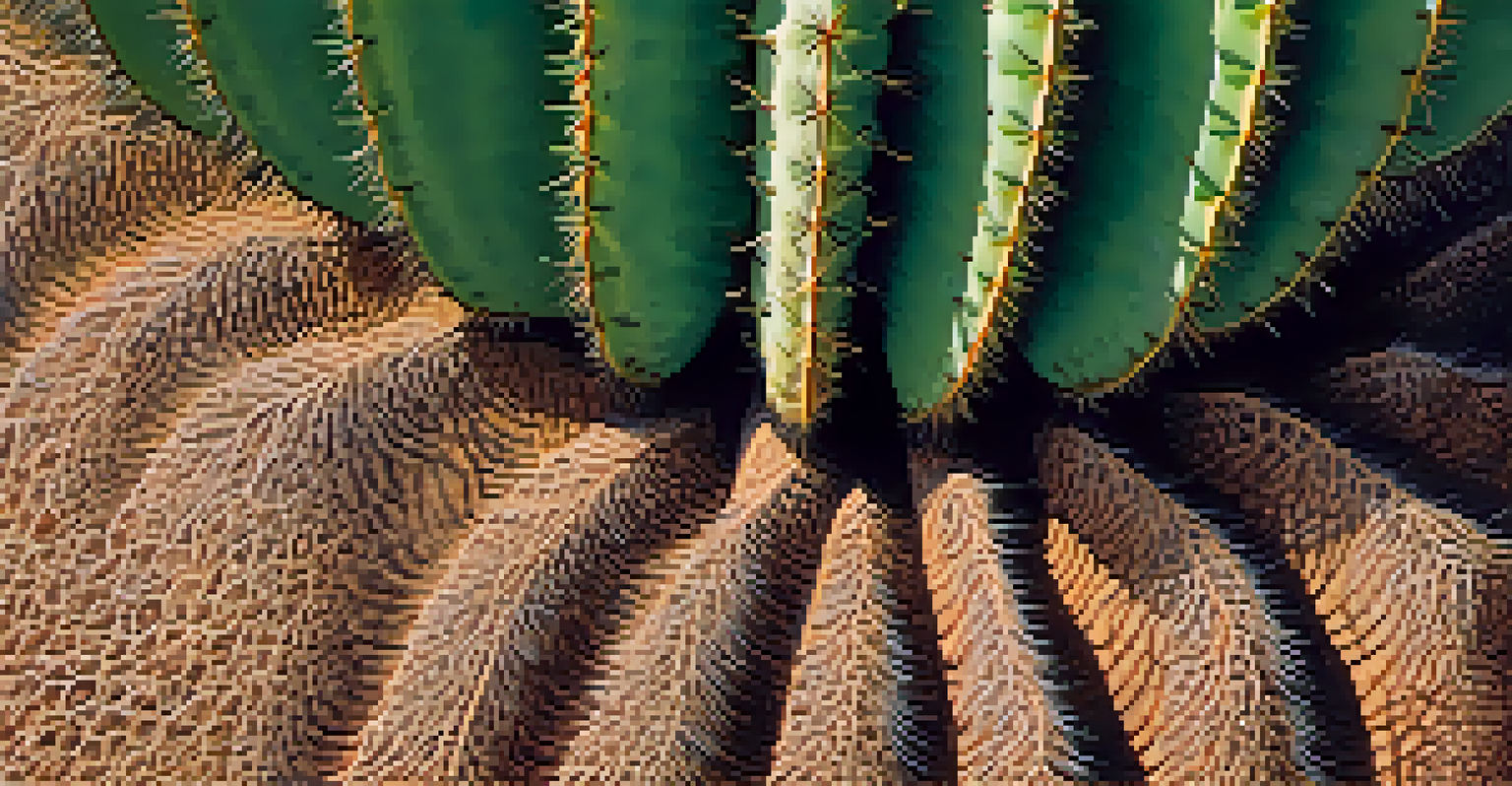Psychedelic Therapy: Peyote's Role in Mental Health Treatment

Understanding Psychedelic Therapy and Its Benefits
Psychedelic therapy is an innovative approach to treating mental health conditions, utilizing substances like peyote to enhance therapeutic processes. These substances can facilitate profound psychological insights, helping individuals confront issues that may have been buried deep within their subconscious. By engaging with these substances in a controlled environment, patients often experience breakthroughs that traditional therapy alone may not provide.
Psychedelics can help us to reconnect with our inner selves and reveal the underlying issues that may be holding us back.
The therapeutic benefits of psychedelics have gained traction in recent years, showing promise for conditions such as depression, anxiety, and PTSD. For instance, a study found that participants reported significant reductions in symptoms after guided sessions with psychedelics. This growing body of research suggests that these substances can effectively complement traditional treatments, offering new hope to those struggling with mental health issues.
Moreover, as societal attitudes towards psychedelics continue to evolve, the potential for integrating these therapies into mainstream mental health practices grows. This shift opens the door for more comprehensive treatment plans that address the complexities of mental health, ultimately leading to better patient outcomes.
What is Peyote and Its Historical Significance?
Peyote is a small cactus native to the southwestern United States and Mexico, known for its psychoactive properties. For centuries, indigenous cultures have used peyote in spiritual rituals, seeking guidance and healing through its effects. This traditional usage underscores peyote's deep-rooted connection to cultural practices and its potential as a healing agent.

The key active component in peyote is mescaline, a substance that alters perception and can lead to introspective experiences. These experiences have been pivotal in traditional healing ceremonies, promoting emotional and spiritual wellbeing among indigenous communities. The reverence for peyote in these cultures highlights its potential as a therapeutic tool.
Psychedelics Enhance Therapy Outcomes
Psychedelic therapy, particularly with substances like peyote, offers new avenues for healing by facilitating emotional breakthroughs that traditional methods may not achieve.
As modern science explores these ancient practices, researchers are uncovering how peyote can contribute to mental health treatment. By validating traditional knowledge through scientific inquiry, there is a growing appreciation for peyote's role in holistic healing approaches.
The Mechanism of Action: How Peyote Affects the Brain
Psychedelics like peyote interact primarily with serotonin receptors in the brain, particularly the 5-HT2A receptor. This interaction leads to altered states of consciousness, enabling users to perceive the world differently. By changing the way information is processed in the brain, peyote can facilitate emotional release and cognitive shifts that are therapeutic in nature.
The future of medicine is not about pills and procedures, but about understanding the mind and the spirit.
Additionally, the experience of using peyote often leads to increased connectivity between different regions of the brain. This heightened connectivity can provide new perspectives on existing problems, making it easier for individuals to confront and process their emotions. Such experiences can catalyze healing, particularly in cases involving trauma or entrenched negative thought patterns.
Understanding how peyote works at a neurological level helps demystify its effects and supports its use in therapeutic settings. As we continue to learn about these mechanisms, we can better harness the potential of peyote in mental health treatment.
Research and Clinical Trials Involving Peyote
The resurgence of interest in psychedelic therapy has led to numerous studies exploring the efficacy of peyote in treating various mental health conditions. Clinical trials are increasingly focusing on its effects on depression, anxiety, and addiction, providing valuable insights into its therapeutic potential. For example, some studies have reported significant improvements in mood and emotional wellbeing following controlled peyote sessions.
In these trials, participants often undergo extensive psychological evaluations before and after treatment, allowing researchers to gauge the impact of peyote on mental health. These findings contribute to a growing body of evidence supporting the integration of psychedelics into therapeutic practices. As more data becomes available, the therapeutic landscape may shift to include these substances more widely.
Peyote's Cultural and Therapeutic Roots
Historically used in indigenous rituals, peyote's psychoactive properties are now being explored for their potential benefits in modern mental health treatment.
Moreover, research is expanding to include diverse populations, ensuring that findings are applicable to a broader audience. This inclusivity is crucial for understanding how peyote can benefit various demographics, ultimately enhancing its role in mental health treatment.
Psychedelic Therapy: A New Approach to Mental Health
Psychedelic therapy represents a paradigm shift in mental health treatment, moving away from traditional methods to embrace more holistic approaches. By integrating substances like peyote, therapists can facilitate deeper emotional exploration and healing. This transition signals a growing acceptance of innovative treatments that prioritize patient experiences and outcomes.
The therapeutic relationship between the patient and therapist is vital in this context, as guided sessions can help individuals navigate their experiences with peyote. Therapists play a crucial role in creating a safe space, allowing patients to explore their inner worlds without fear. This supportive environment can enhance the therapeutic benefits of peyote, leading to lasting change.
As more mental health professionals become trained in psychedelic therapy, we may witness a shift in treatment modalities. This evolution could pave the way for more effective interventions, ultimately improving the lives of those struggling with mental health challenges.
Challenges and Considerations in Using Peyote
Despite the promising research, there are challenges and ethical considerations surrounding the use of peyote in therapy. One major concern is accessibility, as peyote is a protected species and its use is often restricted. This limitation raises questions about how to ensure that all individuals who could benefit from peyote therapy have access to it.
Moreover, the cultural significance of peyote among indigenous peoples must be respected, as its use in therapeutic settings may be viewed as appropriation. It’s essential to engage with these communities and incorporate their perspectives into the conversation about peyote therapy. This collaboration can help navigate the complexities of cultural sensitivity and ethical use.
Research Supports Psychedelic Use
Ongoing clinical trials are revealing significant improvements in mental health conditions like depression and anxiety through controlled peyote sessions.
Finally, as with any treatment, individual responses to peyote can vary widely. Some may experience profound healing, while others may not find it beneficial. This variability underscores the importance of personalized treatment plans that consider each individual's unique circumstances and needs.
The Future of Peyote in Mental Health Treatment
The future of peyote in mental health treatment looks promising as ongoing research continues to shed light on its benefits. With increasing public interest and acceptance of psychedelic therapy, we might soon see peyote integrated into mainstream mental health practices. This potential integration could lead to more innovative approaches to mental health care that prioritize patient wellbeing.
As scientific understanding of peyote deepens, it may also inspire new therapeutic frameworks that combine traditional knowledge with modern psychology. This fusion could lead to more culturally competent care that respects and honors indigenous practices while providing effective mental health interventions.

Ultimately, the journey of peyote in the realm of mental health is just beginning. As we explore its possibilities, we must remain committed to ethical practices and respectful integration, ensuring that the benefits of peyote therapy are accessible to all who seek healing.